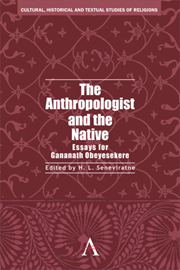Book contents
- Frontmatter
- Contents
- Editor's Note
- The Anthropologist and the Native: Essays for Gananath Obeyesekere
- SECTION I THE INDIAN TRADITION AND ITS REPRESENTATION
- Language and Race in Colonial Representations of Indian Society and Culture
- When the Paramparā Breaks: On Gurus and Students in the Mahābhārata
- The Living and the Dead: Ideology and Social Dynamics of Ancestral Commemoration in India
- On Singularity: What Sanskrit Poeticians Believe to be Real
- SECTION II CASTE, KINSHIP, LAND AND COMMUNITY
- SECTION III RENUNCIATION AND POWER
- SECTION IV BUDDHISM TRANSFORMED
- SECTION V THE ENIGMA OF THE TEXT
- SECTION VI THE ANTHROPOLOGIST AND THE NATIVE
- List of Contributors
Language and Race in Colonial Representations of Indian Society and Culture
from SECTION I - THE INDIAN TRADITION AND ITS REPRESENTATION
Published online by Cambridge University Press: 05 May 2012
- Frontmatter
- Contents
- Editor's Note
- The Anthropologist and the Native: Essays for Gananath Obeyesekere
- SECTION I THE INDIAN TRADITION AND ITS REPRESENTATION
- Language and Race in Colonial Representations of Indian Society and Culture
- When the Paramparā Breaks: On Gurus and Students in the Mahābhārata
- The Living and the Dead: Ideology and Social Dynamics of Ancestral Commemoration in India
- On Singularity: What Sanskrit Poeticians Believe to be Real
- SECTION II CASTE, KINSHIP, LAND AND COMMUNITY
- SECTION III RENUNCIATION AND POWER
- SECTION IV BUDDHISM TRANSFORMED
- SECTION V THE ENIGMA OF THE TEXT
- SECTION VI THE ANTHROPOLOGIST AND THE NATIVE
- List of Contributors
Summary
In The Apotheosis of Captain Cook; European Mythmaking in the South Pacific, Gananath Obeyesekere makes a bold intervention in the debate on 18th century racism (Obeyesekere 1992). I would like to take this celebratory occasion to explore further the nature of racism by taking the systematic ideology of colonial rule that prevailed in the following century based upon hardening theories of race, hierarchy and evolution. The immediate antecedents to this ideology were burgeoning ideas about human evolution that were emerging during the Enlightenment. As the medieval doctrine of the Chain of Being was assimilated to the modern notions of progress, the savants ranked societies according to their supposed levels of achievement. The Europeans occupied the summit while the Africans were placed at the bottom, with the Orientals coming somewhere in between. However, to the savants of the Enlightenment European superiority was not inherent but a product of climate and social and political institutions (Boyd 1950; Stocking 1968; Barzun 1965; Curtin 1964, II; Burrow 1971; Gould 1981).
However in the next century, racial and evolutionary doctrines began to gel as European superiority was increasingly attributed to innate racial qualities. Race as a concept, in the sense that biological and cultural characteristics were intimately connected, first appeared in studies of social institutions in the 19th century. Its exponents were hardly unanimous in their definition of the word, but they all agreed that biological inheritance determined culture.
- Type
- Chapter
- Information
- The Anthropologist and the NativeEssays for Gananath Obeyesekere, pp. 19 - 34Publisher: Anthem PressPrint publication year: 2011



